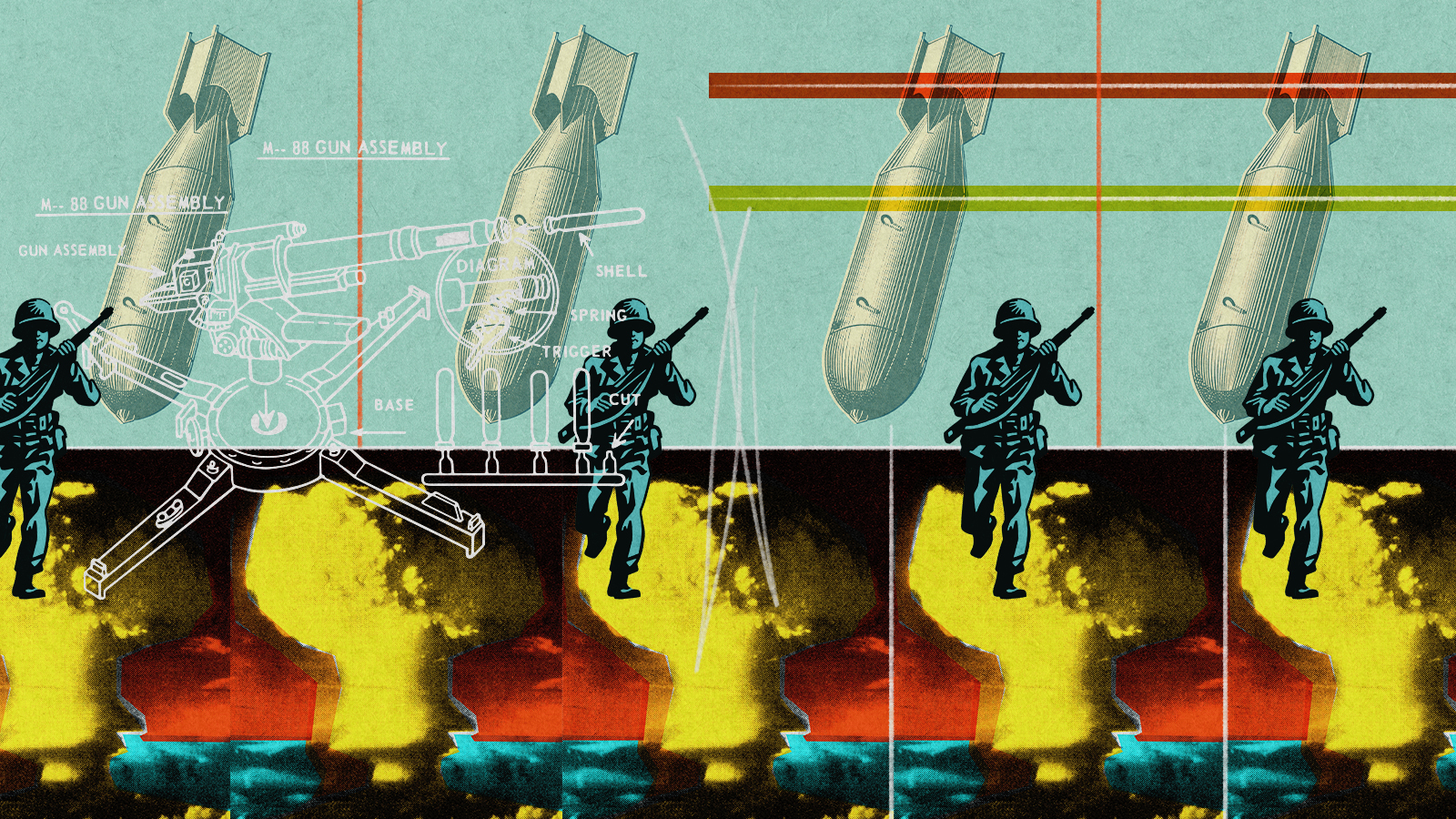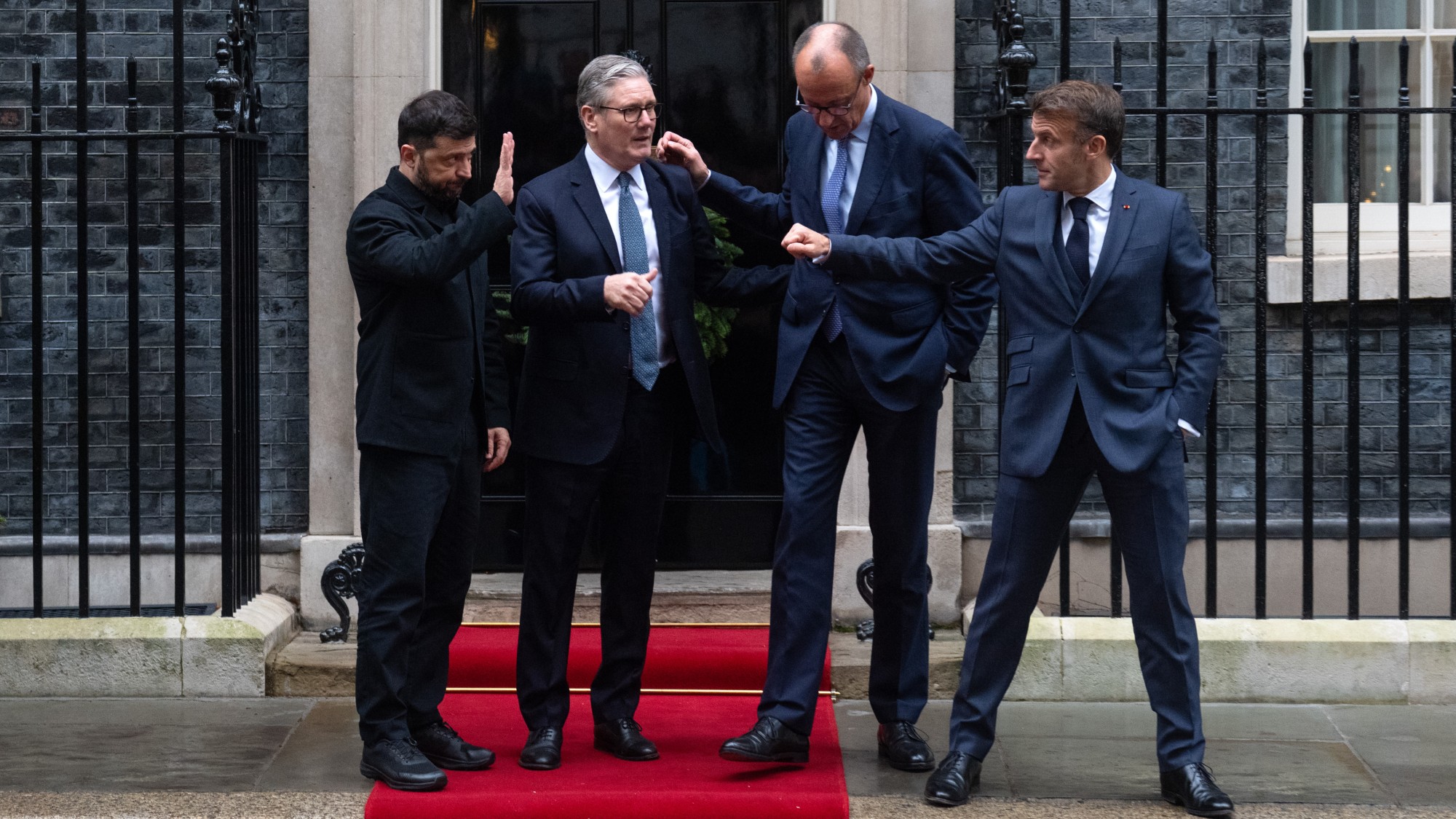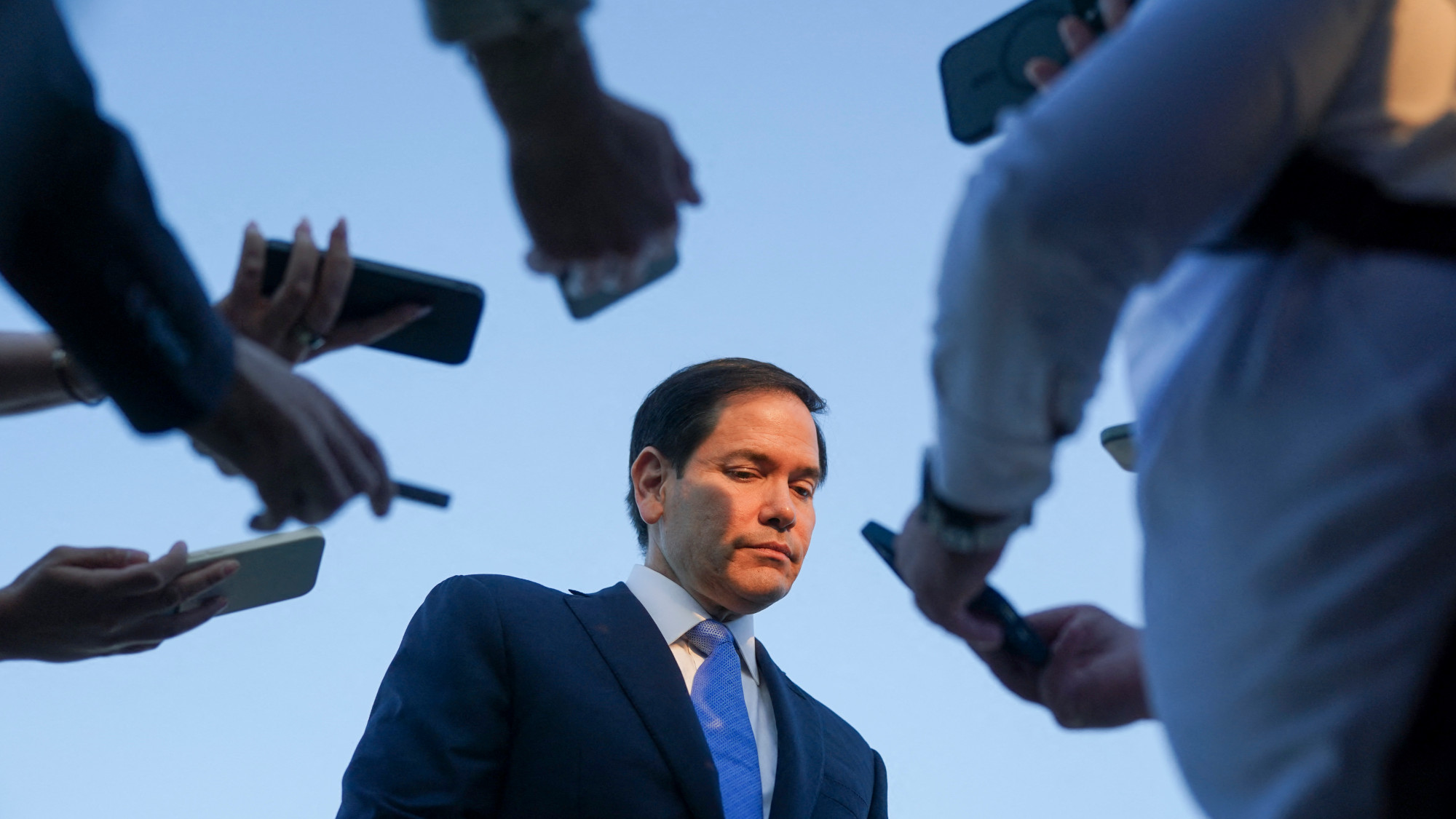Eventually, our nuclear luck will run out
Putin might not use nukes. But someday, someone will.


A free daily email with the biggest news stories of the day – and the best features from TheWeek.com
You are now subscribed
Your newsletter sign-up was successful
As fears of escalation in Ukraine increase with every day of Russia's deranged invasion, the specter of nuclear war spreads over the planet. Will Russian President Vladimir Putin authorize the use of "tactical" nuclear weapons, most of which are stronger than the nightmare devices dropped on Japan in 1945? The risk of annihilation remains low at any given moment, but the longer we allow states to threaten one another with this kind of eradication, the more likely it is we'll eventually stumble into a catastrophic nuclear event. Maybe it won't happen this year, this war, or this century. But in the long-term, in a world with nukes, nuclear war is inevitable.
The war in Ukraine should, if nothing else, push us to take stock of the inhuman policies that keep total destruction a perpetual option. If we can't act now, when the risk of the worst-case scenario has become horrifyingly real, will we ever act?
It's true that, historically, mutually assured destruction (MAD) has made war between nuclear powers less likely. Since the United States dropped atomic bombs on Hiroshima and Nagasaki, not only has no state used these devices in war, but no two nuclear-armed countries have fought a major, direct armed conflict with one another. The logic of MAD has held up surprisingly well.
The Week
Escape your echo chamber. Get the facts behind the news, plus analysis from multiple perspectives.

Sign up for The Week's Free Newsletters
From our morning news briefing to a weekly Good News Newsletter, get the best of The Week delivered directly to your inbox.
From our morning news briefing to a weekly Good News Newsletter, get the best of The Week delivered directly to your inbox.
There are at least three reasons, however, to be skeptical MAD will prevent nuclear war forever. First, there is the flip side of deterrence, which unfortunately is what we see today in Ukraine. Putin is using nuclear blackmail to keep NATO out of the conflict. Were he to introduce "small" nuclear weapons to turn the tide of the war, would the U.S. and its allies really risk a worldwide nuclear exchange by initiating a limited nuclear or conventional counterattack? No one knows for sure, because these kinds of questions have been purely theoretical throughout the atomic age.
The second is statistical probability. The number of nuclear powers in the world continues to go up — slowly, but the secular trend is clear. And the more nuclear weapons there are in more places, the more likely use, whether deliberate or accidental, becomes. I asked Jon Wolfsthal, who served as an arms control official for former President Barack Obama's National Security Council and is now a senior advisor at the abolitionist organization Global Zero, why he worries about the risk of nuclear war. "Our luck has relied on humans getting it right every single time," he told me in an email. "Eventually that luck will run out."
Any system designed by fallible people is subject to design flaws, human error, and happenstance, as the terrifying history of nuclear near-misses demonstrates. There is no such thing as an accident- or mishap-proof technology. Given a long enough time horizon, even the most unlikely event will transpire if the odds are above zero.
One last reason is that the instability of the global nuclear regime has never been more apparent. As Russia and NATO trade barbs and citizens familiarize themselves with scenarios of nuclear war, states like Saudi Arabia, Japan, South Korea, Brazil, and others are left wondering whether anything but nuclear arms will protect them from a more powerful actor exerting its will over them. The present plight of Ukraine, which voluntarily relinquished its nukes after the collapse of the Soviet Union, as well as the experiences of regimes in Iraq and Libya, where a nuclear arsenal might have precluded U.S. invasion, will only lead more countries to join the nuclear club.
A free daily email with the biggest news stories of the day – and the best features from TheWeek.com
The Non-Proliferation Treaty and the International Atomic Energy Agency (IAEA) are clever and resilient institutions, but they cannot forever withstand the unrelenting pressure on countries to pursue a technology that appears to bestow immunity from invasion and conquest. And new rivals in possession of the world's most destructive technology are likely to be much geographically closer to one another than were the U.S. and USSR, with less instrinsic restraint due to the ever-retreating memory of 1945. Worse, these rivalries can only intensify in a warming, unpredictable world beset by climate migration, natural resource scarcity, and existential anxiety.
What would it look like if humanity's good fortune vanished, even for an hour? In her 2004 essay "City on Fire," Lynn Eden walks the reader through what would happen if a single medium-yield nuclear weapon were detonated over the Pentagon in Washington, D.C. A one-mile diameter fireball would briefly heat up to over 200 million degrees Fahrenheit, igniting a firestorm. The blast radius would flatten buildings for miles. "Virtually no one in an area of 40-65 square miles would survive." Everyone and everything up to 4.6 miles from ground zero would be in flames within 10 minutes or so.
Alex Wallerstein's once-again trendy Nukemap estimates that a 300-kiloton bomb detonated over the Pentagon would kill more than 248,000 people and injure more than 588,000. The entire population of the District of Columbia, in other words, would be killed more or less instantly. A lucky few might "only" be gravely injured. Mind you, this is one bomb. In a general nuclear conflict, D.C. could well be targeted by dozens of nukes, and the resulting firestorm alone would likely consume most of suburban Virginia and Maryland.
For the survivors, the day after would be just the beginning of their ordeal. In any kind of significant nuclear war between Russia and the United States — or possibly even if the 300 or so warheads in the arsenals of India and Pakistan were exploded over the cities of the subcontinent — Earth would likely be plunged into a nuclear winter by the smoke from civilization's incineration. The mean surface temperature of the planet could plummet as much 50 degrees Fahrenheit within two or three years, resulting in "a 90 percent reduction in the growing season," in much of the world, according to science journalist Sarah Derouin.
From there we would be in unknown territory. Life would be very difficult for survivors. But whatever the details, it should be obvious to all: Anything is better than plunging into this dystopia by accident.
The one sure way to avoid that fate is disarmament. Yet the nuclear club members have never made a meaningful effort there, though abolition is the expressed goal of the global non-proliferation regime itself.
"Nuclear weapons are distinguished above all by their unparalleled destructive power," the late Jonathan Schell, perhaps the 20th century's most prominent nuclear abolitionist, wrote in 1998. "Their singularity, from a moral point of view, lies in the fact that the use of just a few would carry the user beyond every historical benchmark of indiscriminate mass slaughter."
They still would, and it is long since past time to take that option off the table.
David Faris is a professor of political science at Roosevelt University and the author of "It's Time to Fight Dirty: How Democrats Can Build a Lasting Majority in American Politics." He's a frequent contributor to Newsweek and Slate, and his work has appeared in The Washington Post, The New Republic and The Nation, among others.
-
 The ‘ravenous’ demand for Cornish minerals
The ‘ravenous’ demand for Cornish mineralsUnder the Radar Growing need for critical minerals to power tech has intensified ‘appetite’ for lithium, which could be a ‘huge boon’ for local economy
-
 Why are election experts taking Trump’s midterm threats seriously?
Why are election experts taking Trump’s midterm threats seriously?IN THE SPOTLIGHT As the president muses about polling place deployments and a centralized electoral system aimed at one-party control, lawmakers are taking this administration at its word
-
 ‘Restaurateurs have become millionaires’
‘Restaurateurs have become millionaires’Instant Opinion Opinion, comment and editorials of the day
-
 ‘The forces he united still shape the Democratic Party’
‘The forces he united still shape the Democratic Party’Instant Opinion Opinion, comment and editorials of the day
-
 The billionaires’ wealth tax: a catastrophe for California?
The billionaires’ wealth tax: a catastrophe for California?Talking Point Peter Thiel and Larry Page preparing to change state residency
-
 Trump considers giving Ukraine a security guarantee
Trump considers giving Ukraine a security guaranteeTalking Points Zelenskyy says it is a requirement for peace. Will Putin go along?
-
 Vance’s ‘next move will reveal whether the conservative movement can move past Trump’
Vance’s ‘next move will reveal whether the conservative movement can move past Trump’Instant Opinion Opinion, comment and editorials of the day
-
 Bari Weiss’ ‘60 Minutes’ scandal is about more than one report
Bari Weiss’ ‘60 Minutes’ scandal is about more than one reportIN THE SPOTLIGHT By blocking an approved segment on a controversial prison holding US deportees in El Salvador, the editor-in-chief of CBS News has become the main story
-
 Will there be peace before Christmas in Ukraine?
Will there be peace before Christmas in Ukraine?Today's Big Question Discussions over the weekend could see a unified set of proposals from EU, UK and US to present to Moscow
-
 Ukraine and Rubio rewrite Russia’s peace plan
Ukraine and Rubio rewrite Russia’s peace planFeature The only explanation for this confusing series of events is that ‘rival factions’ within the White House fought over the peace plan ‘and made a mess of it’
-
 Has Zohran Mamdani shown the Democrats how to win again?
Has Zohran Mamdani shown the Democrats how to win again?Today’s Big Question New York City mayoral election touted as victory for left-wing populists but moderate centrist wins elsewhere present more complex path for Democratic Party
